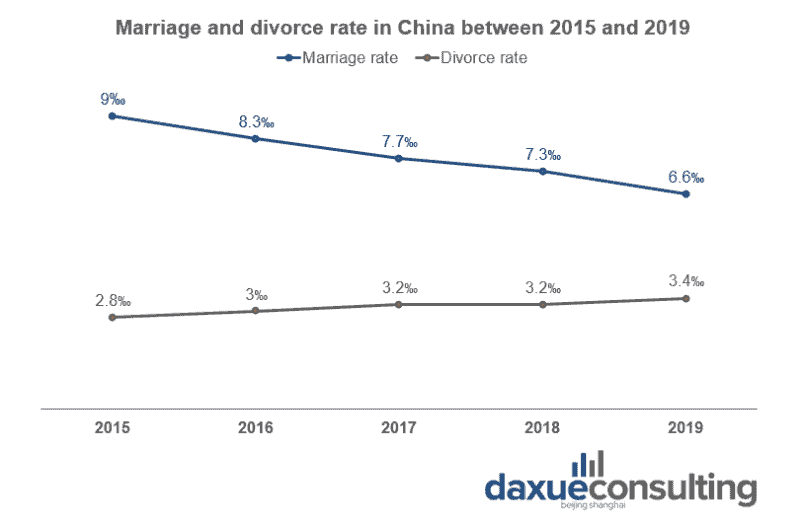As the population ages and the national birthrate keeps on declining, China undergoes another deep transformation which will leave a mark on the country’s social and economic structure. According to China’s Ministry of Civil Affairs, from 2014 on, the amount of marriages gradually dropped over the years: in 2019, about 9.3 million couples tied the knot, recording a decrease of 8.5% compared to the previous year. Thus, the marriage rate hit 6.6%, leading to a 0.7 per mil points fall. Meanwhile, the number of divorces grew steadily totaling to 4.7 million couples in 2019 and boasting a 5.4% rise.

At the end of 2018, singles in China amounted to about 240 million, accounting for 22% of people over 20 years old. Current Chinese market-oriented economic structure, along with the growing exposure of Chinese new generations to the Western lifestyle, puts into question traditional values like filial piety, which impelled young people to settle down and start a family as soon as possible. Consequently, the social stigma associated with singledom is gradually weakening and Chinese youngsters begin to maintain that marriage is not a precondition for living a fulfilled life.
Great potential of singles economy in China
Such transition can be observed in the way Chinese netizens refer to singles as well. If once they talked about 单身狗 “single dogs” linking not being in a couple to loneliness and despair, currently the expression单身贵族 “single aristocrats” is gaining ground since they vaunt a significant financial power. Moreover, urban Chinese singles boast high marginal propensity to consume and, according to Euromonitor, their consumption rate is expected to hike threefold between 2019 and 2040. It therefore seems evident that both foreign and domestic brands cannot underestimate the great potential of the singles economy in China.
Where singles spend more money than couples do
Singles economy in China covers different industries that Nielsen summarized into four macro-areas: self-care, convenience, self-improvement and companionship. In particular, Chinese unmarried people are a growing driver of growth for meeting apps, beauty and wellness, food delivery, leisure and pets.
Dating apps
When talking about singles economy in China, it is impossible not to mention meeting apps. The Covid-19 pandemic made it difficult having face-to-face meetings and encouraged people to stay home boosting the number of users on online dating platforms. According to Statista, Momo and Tantan are the most used app in China, boasting around 52,600 and 31,978 monthly active users respectively as of May 2021. Momo is not just a location-based meeting app, but it actually provides its members with a wide range of additional features, such as group chats, live streaming, short-videos, mini games and a premium membership plan. Instead, Tantan is very similar to Tinder: users can swipe right or left to connect with people and potentially opt for a premium plan. Such platform is quite popular among Gen-Zs: people born after the 90s account for 80% of its user base. In 2018, Momo acquired Tantan.
Launched in 2012, Blued is the largest gay dating app in China. Like Momo, it is much more than a location-based meeting platform since it allows users to share videos and pics, join live streaming and subscribe for a premium plan including ad-free usage and private mode view of other members’ profiles. Moreover, in order to protect users’ privacy, pics sent in chat disappear after few seconds and screenshots are not possible.
Food delivery
Unmarried people are among the main drivers of the lazy economy in China. According to Quest Mobile 2019 Insight on Singles Report, five among singles’ top 10 most frequently used apps are delivery food platforms: Meituan, Ele.ma, Luckin Coffee, Starbucks and KFC. Social stigma discourages people from going to dine alone, thus attracting solo diners reveals a difficult task for restaurants. In 2017, famous Chinese hotpot chain Haidilao started putting large stuffed animals in empty seats in order to accompany solo diners in its restaurants and make them feel more at ease. Other restaurants decided instead to arrange their interior design in a single-friendly way. For instance, Beijing noodle bar 23 Seats serves meals in separate cubicles so as to prevent customers from feeling awkward about dining alone.
Beauty and wellness
Self-care is a key concept of the singles economy in China since Chinese unwed people pay greater attention to their look and physical wellness than couples do. According to Nielsen, unmarried people tend to spend more money in clothes and skincare products than non-singles do, especially as regards items in the high-end range. Moreover, Quest Mobile indicated health awareness, medical beauty and fitness as the hot topics attracting unwed consumers in China’s health and beauty market in 2019.
In an attempt to look more single-friendly, beauty brands are introducing smaller sizes and refillable containers, but this is just one of the possible methods companies can use to establish a connection with singles. In October 2020, the Chinese underwear brand NEIWAI launched a campaign with designer brand Xu Zhi called “Intimate shapes”. For the event, the brand released a five-minute video on social platforms providing distinct ways of conceptualizing intimate relationships. Through showing three couples and two singles, the brand highlighted the importance of establishing an intimate relation with one’s own body and gave to self-care the same importance as to mutual care.

Leisure time
The leisure, travel and tourism industry is another area where Chinese singles are willing to spend more than their non-single peers are, especially in the high-end realm. Beyond taking care of their physical appearance, singles in China pay great attention to their inner beauty as well. According to Nielsen report, 22% of them declare having a lot of time to read books, 18% likes engaging in new activities such as learning to play an instrument or drawing, and another 16% is eager to widen their own knowledge studying or reading.
Concerning travel and tourism, singles’ and non-singles’ preferences not always overlap. As the amount of Chinese solo travelers seeking for impressive experiences grows, leading players in the hospitality industry attempt to meet their needs designing special boutique hotels capable to convey intense emotions and a strong sense of independence. For instance, luxury resort groups such as Aman and Banyan Tree opened several boutique hotels across the whole country.
Pets
Many Chinese singles are big contributors to the pet economy: singles accounted for 15% of Chinese pet owners in 2021, but as the number of Chinese unwed people grows, the share of one-person households having a pet will rise as well. Beyond purchasing products and services for their own animals, singles are among the main consumers of pet-related content online. According to the report released by Topclout.com, people who do not have any four-legged friend enjoy watching cute pet videos and pics as a morale-booster, a source of entertainment or a relief to their loneliness. Moreover, pets are often associated with a more refined and joyful life, that is why marketing promotion in animal-related content covers a broad range of services and products that often have nothing to do with pets, aiming to meet the needs of the great variety of people interested in cute animals.
Diving into the singles economy in China
Young tech-friendly Chinese singles boasting a high propensity to consume represent an irresistible target for brands, thus it is not surprising that companies are struggling to catch their attention and that China’s most important shopping festival is called Singles’ Day.
Danshen Liang is a Shanghai-based startup founded in 2017 offering snacks specifically to singles living in Tier-1 cities. The name of the brand is not random: it could be translated as “food for singles” and the packaging of their snacks portrays a dog reminding the expression单身狗. Such peculiar marketing strategy led the startup to earn more than 200 million RMB in just two years and made it quite popular on Chinese social networks.
Burberry attempted to capture singles’ interest as well. For Qixi 2019, the luxury brand launched a campaign depicting different ways to conceptualize love: love for a partner, love for pets, love for idols and love for oneself. In this way, Burberry wanted to express that previously mentioned ones are all possible interpretations of love and everyone has the final say on which one to choose.

Lessons from the singles economy in China
- As society changes, less and less people get married and the number of singles in China increases. Singles reveal being a powerful engine of growth for several industries, especially for those relating to dating apps, beauty and wellness, food delivery, leisure and pets.
- Because of the global pandemic, increasingly more people opted for using dating platforms, such as Momo, Tantan and Blued.
- Restaurants are refining their marketing techniques in order to attract solo diners and make them feel at ease.
- Self-care is a keyword in China’s singles economy since Chinese unwed people are major consumers of high-end skincare products and clothes. In particular, singles play a major role in those industries dealing with health awareness, medical beauty and fitness.
- The leisure, travel and tourism sector is another area where Chinese unmarried people are keen to spend more than their non-single peers are. Firstly, singles tend to invest a lot in their personal growth and join a great variety of activities. Secondly, when it comes to travel, Chinese solo tourists seek for unforgettable experiences and prefer spending their stay in boutique hotels capable to convey intense emotions and a strong sense of independence.
- Singles are a major driver for the pet economy in China. Beyond representing the fastest-growing category of pet owners, single-person households especially enjoy consuming pet-related content online.
- Both foreign and domestic brands in China are focusing their efforts in establishing a connection with Chinese singles. The Shanghai-based Danshen Liang directly targets singles with their snacks using a funny and evocative marketing strategy. Burberry tried to capture singles’ interest as well, through conveying the idea that love is a multifaceted feeling and self-care is as noble as other kinds of love.





